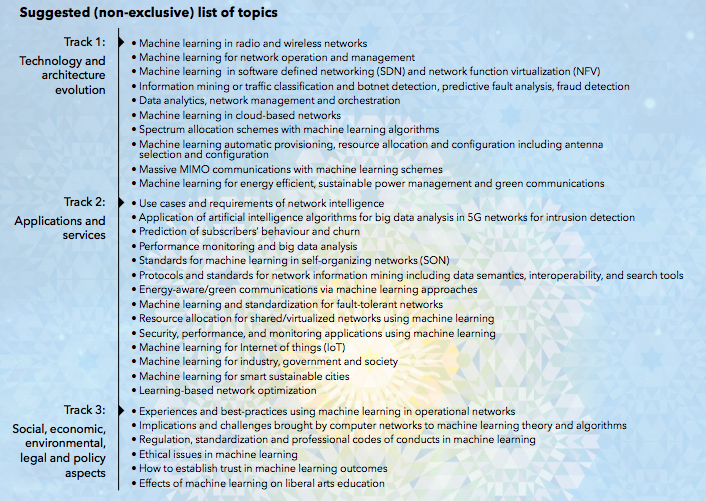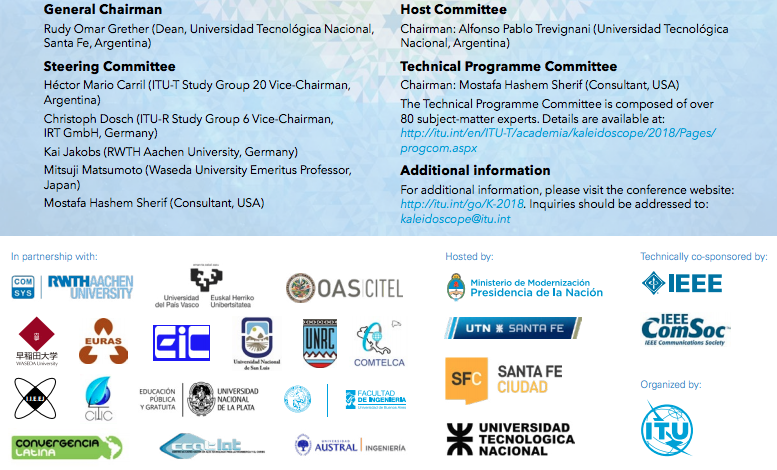Llamado a presentar trabajos en ITUKaleidoscope 2018
Kaleidoscope 2018: Machine learning for a 5G future is the tenth in a series of peer-reviewed academic conferences organized by ITU to bring together a wide range of views from universities, industry and research institutions. The aim of the Kaleidoscope conferences is to identify emerging developments in information and communication technologies (ICTs) and, in particular, areas in need of international standards to aid the healthy development of the Information Society.
Theme
Machine learning shows promise to assist smarter use of networkgenerated data, enabling ICT network operators and service providers to adapt to changes in traffic patterns, security risks and user behaviour. This will also affect ITU standardization work in fields such as coding algorithms; data collection, storage and management; and network management and orchestration.
Kaleidoscope 2018 invites the research community to share insights into emerging applications of machine learning capable of bringing more automation and intelligence to network design, operation and management.
The conference will explore promising machine-learning technologies and applications, investigating how supporting standardization could ensure widespread access to the benefits of machine learning.
Contributors to Kaleidoscope 2018 are encouraged to consider questions such as, for example:
- What are the distinct technical requirements of machinelearning use cases in 5G and future networks with respect to network architectures, interfaces, protocols, algorithms and data formats?
- How might we verify the compatibility of machine-learning applications in 5G networks with legacy fixed and mobile communication networks?
- Are machine-learning capabilities and human expertise complementary? If so, how could we best go about exploiting this?
- What might be considered appropriate technical, legal and social models to govern access to the results of applied machine learning?
Objective
Kaleidoscope 2018 calls for original scientific papers addressing advances in research on machine learning and artificial intelligence techniques for future communication networks, covering all aspects of network design, management, implementation and optimization. This year’s conference will assist ITU standardization experts in capitalizing on machine learning in their preparations for the 5G era and beyond. Authors of outstanding papers will be invited to contribute to the work of ITU-T Focus Group on Machine Learning for Future Networks including 5G.
Audience
Kaleidoscope 2018 targets specialists in the fields of ICT and socio-economic development, including researchers, academics, students, engineers, policymakers, regulators, innovators and futurists.
Date and venue 26-28 November 2018, Universidad Tecnológica Nacional, Santa Fe, Argentina
Submission of papers
Prospective authors from ITU Member States are invited to submit full, original papers with a maximum length of eight pages, including abstract and references, using the template available on the event website. All papers will go through a double-blind peer-review process. Submission must be made electronically; see http://itu.int/go/K-2018 for more details on online submission (EDAS).
Paper proposals will be evaluated according to content, originality, clarity, relevance to the conference’s theme and, in particular, significance to future standards.
Deadlines
Submission of full paper proposals:4 June 2018
Notification of paper acceptance: 17 September 2018
Submission of camera-ready accepted papers: 8 October 2018
Publication and presentation
Accepted and presented papers are published in the Conference Proceedings and will be submitted for inclusion in IEEE Xplore. The best papers will also be evaluated for potential publication in the IEEE Communications Standards Magazine. In addition, extended versions of selected papers will be considered for publication in the International Journal of Technology Marketing, the International Journal of Standardization Research, or the Journal of ICT Standardization.
Awards
A prize fund totaling CHF 6,000 will be shared among the authors of the three best papers, as judged by the Steering and Technical Programme Committees. In addition, young authors of up to 30 years of age presenting accepted papers will receive Young Author Recognition certificates.
Keywords
Information and communication technologies (ICTs), standards, standardization, technological innovation, information society, artificial intelligence, expert systems, machine learning, algorithms, swarm intelligence, neural networks, intelligent adaptive learning, big data analytics, data mining, fuzzy logic, statistical analysis, cognitive systems, communication technologies, communication networks, wireless communications, future networks, radio spectrum, security, privacy, reliability, Internet of things, image and video communication, monitoring, forecasting, optimization, policy, regulation, ethics, intellectual property rights, technical cooperation, sustainability, development, access, equality, inclusiveness.












